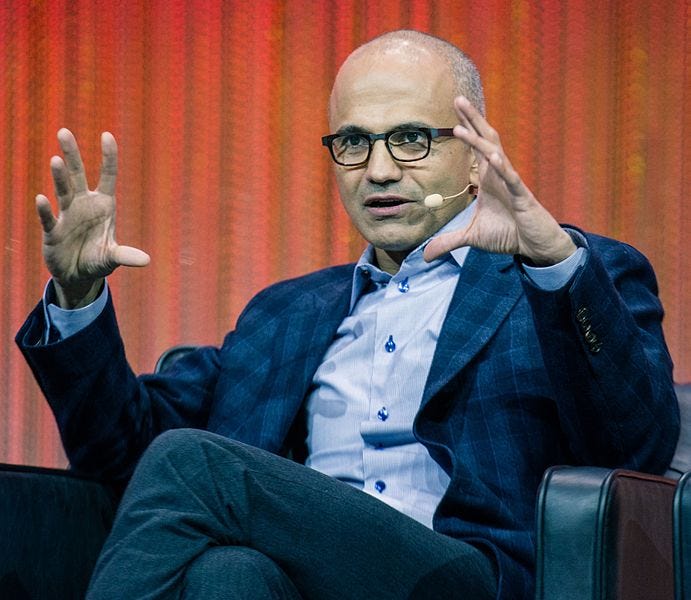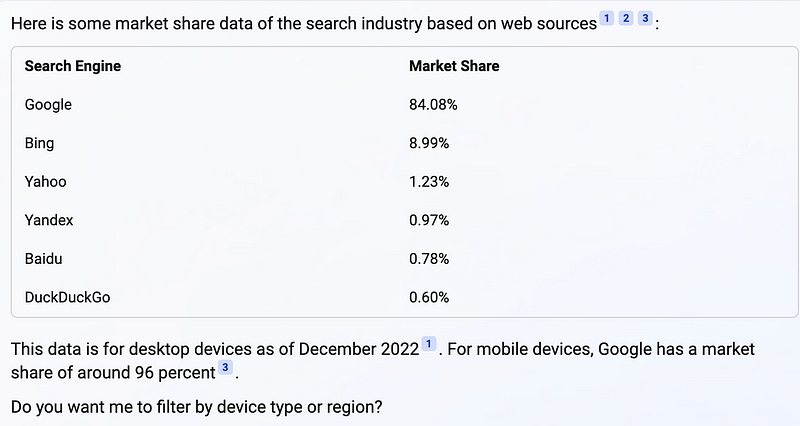The Business Viability of Microsoft Bing and ChatGPT Integration
Written on
Chapter 1: A New Era for Microsoft Bing
Recently, I had the opportunity to explore Microsoft Bing enhanced by GPT-4 technology. The experience was remarkable. Research inquiries that would typically occupy a junior analyst for an hour can now be answered in mere seconds. For instance, I asked, “Can you provide market share statistics for the search industry in table format?” The results were instantaneous. Consequently, my primary search engine has transitioned from Google to Microsoft Bing.

Source: OFFICIAL LEWEB PHOTOS, CC BY 2.0, via Wikimedia Commons
From the data I gathered, it is clear that Microsoft Bing's earnings are significantly lower than those of Google Search.

Source: Bing Search Results
Microsoft's CEO, Satya Nadella, is eager to capture a larger share of the search market, striving to rival Google's core business operations. Recent trends indicate a noticeable uptick in interest surrounding Microsoft Bing.

Source: Google Trends
Nadella has a long history with Bing, having joined Microsoft in 1992. His initial focus was on Windows NT, but he later contributed to various projects, including the development of online advertising and cloud services. By 2008, he had taken on a significant role in the Online Services Division, which encompassed Bing. His leadership was pivotal in crafting Microsoft’s search strategy and fostering innovation within Bing’s development teams. Presently, he is revolutionizing the search experience with Microsoft Bing.
However, a closer examination reveals that the Bing and ChatGPT integration faces substantial business hurdles.
Section 1.1: Major Concerns
Cost Implications
The foremost issue is the financial burden associated with the operation of the new Microsoft Bing. According to insights shared by David Friedberg on the All-In Podcast, the estimated cost to run the GPT-3 model for ChatGPT is about 30 cents per output, which starkly contrasts with Google's 2.5 cents per search result. This heightened expense poses significant challenges for Microsoft in terms of competing effectively against Google.
To become competitive, Bing must drastically lower its operating costs—ideally by a factor of ten. Achieving this would necessitate advanced technical knowledge in optimization and resource management. Until these improvements are implemented, Bing will struggle to match Google's economic efficiency. Given Google's massive scale, running search operations can cost anywhere from eight to twenty billion dollars quarterly.
Reducing expenses will not only enhance Bing's competitive stance but will also enable investment in new features that could better cater to users. This shift could invigorate the search market, offering users more options and intensifying the rivalry between Bing and Google, ultimately resulting in improved user experiences and increased innovation.
Business Model Challenges
Another pressing concern revolves around the monetization strategies for publishers. The current business model employed by Microsoft Bing leaves publishers uncertain about how to profit from their content in the search ecosystem. In an interview with The Verge, Satya Nadella did not provide clear guidance on how publishers might monetize their offerings through Bing.
When users search for information on Bing, they often receive direct answers that may discourage them from visiting the publisher's site for additional details. As AI technology advances, users may increasingly expect immediate answers, further complicating the monetization landscape for publishers.
The traditional model, which relies on presenting paid advertisements alongside organic results, may not be effective when search engines provide direct answers. A possible solution could involve implementing affiliate commissions for links within the search results. However, this approach raises questions about the accuracy and fairness of the information presented, as advertisers might influence outcomes.
Publishers and search engines must collaborate to forge a new business model that enables content monetization while preserving the integrity of search results. Despite these challenges, it is important to acknowledge their temporary nature. With decreasing hardware and computing costs, a viable monetization strategy is likely to emerge if users engage consistently with the platform.
Satya Nadella's leadership and Microsoft's technical prowess in optimization could position Bing as a credible alternative to Google. Nevertheless, it's worth noting that Google has historically been adept at countering competition, and it is unlikely to relinquish its dominant market position easily.
Chapter 2: Future Prospects
The integration of GPT-4 with Microsoft Bing holds significant promise, and it will be intriguing to observe how it influences the search engine landscape moving forward. A pertinent question remains: What strategies will Sundar Pichai employ in response?
This video titled "How To Fix Bing Chat Not Working or Loading - ChatGPT 4 - YouTube" delves into troubleshooting Bing Chat issues, offering viewers insights into maximizing their experience with the platform.
Another insightful video, "Do We Need a ChatGPT Plus Account Anymore? Microsoft Copilot AI Companion Tutorial," explores the necessity of a ChatGPT Plus account in light of the new features and capabilities of Microsoft Copilot.